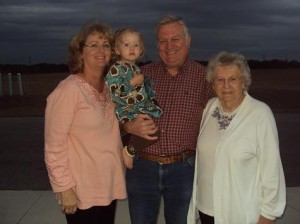Tonight we enjoyed family at a special gathering here in Linnea and Adam’s Florida home. Adam was born and raised in the area and is blessed with lots of extended family nearby, many of whom joined us for a pot roast dinner around the big square table. Adam’s parents, Terry and John, are remarkable examples of faithful believers in Christ, living out their faith through good times and also challenging ones.
As John prayed over the meal tonight, I found myself missing Nate. He would have been John’s parallel-pal at our dinner, two fathers/fathers-in-law who’d found much in common from the day they met. When children grow up and choose spouses, the parents of the bride and groom come together in a strange and interesting way. It’s not expected that they become natural friends, but in rare cases everything clicks, and sweet friendships are born. This was the case with John and Terry, Nate and Margaret.
Terry and I found common ground in our love for the outdoors, particularly gardening and time spent at the beach. John and Nate bonded quickly over their shared love of history. As we took them around the Chicago sites and they did the same for us in St. Augustine, Terry and I had a hard time keeping track of our men. Inevitably, while moving through an attraction, they’d lag behind, deep in talk of the history that took place there.
“C’mon, boys!” we’d holler back at them. “While you’re talking, keep walking!”
As we sat around the dinner table tonight, I wondered if John missed Nate, who’d been on hand during the visits we’d had together to this point. I remembered wondering the same thing back at home when we gathered socially with my sister’s family for the first time after Nate died. Grown kids and many grandkids filled the air with happy chatter, but Bervin didn’t have his parallel-pal, his brother-in-law. Their table talk of politics had been fun for both of them, and now half of the conversation was missing.
I’ve wondered about that with my brother, too, as he and Nate so often rubbed shoulders at the office in Chicago’s Loop. Did he think about Nate, especially at first, when the lawyers moved in and out of the conference room with their lunches? Politically separated, Tom and Nate challenged and teased each other in a friendly banter that’s now missing. They were parallel-pals indeed.
And what about Nate’s breakfast group from church? These men have been together every other Saturday for nearly 20 years, eating at the same restaurant and probably sitting in the same spots. Did they feel sad when Nate no longer came, especially at first? He admired each of these men greatly, worrying about them if they didn’t appear at the breakfast and making their concerns his concerns over the years. Each one was a parallel-pal.
Statistics tell us men don’t make friends easily, and I can testify it was difficult for Nate to open up to other men at first. But as the months and then years passed, barriers came down and in-depth sharing became part of the relationships. Nate was a loyal friend and as far as I know, didn’t sever even one relationship throughout his life. After he made a friend, he was faithful.
Tonight I am newly thankful for Linnea’s Florida in-laws, hoping I can claim them as my relatives, too. But common interests aside, our real bond is as siblings in the Lord’s family. Because God’s good pleasure was to invite us to be parallel-pals as his adoptees, we’ll all be bonded as his children throughout eternity. And that means Nate, too.
“God decided in advance to adopt us into his own family by bringing us to himself through Jesus Christ. This is what he wanted to do, and it gave him great pleasure.” (Ephesians 1:5)




